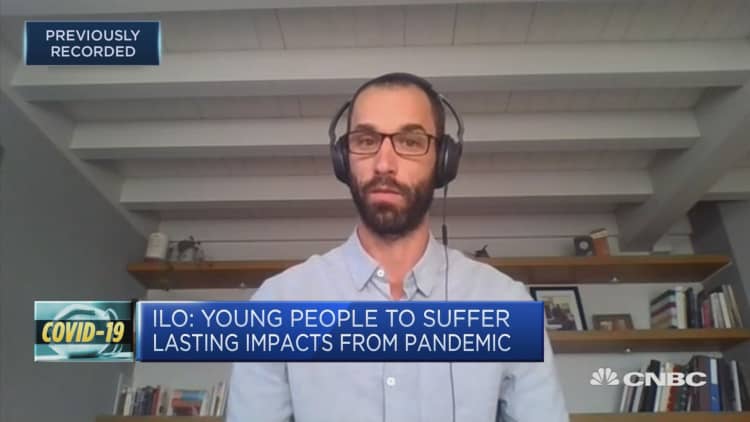Some 42% of young people around the world, who were still working during the pandemic, have seen a drop in income as a result of the coronavirus crisis, a study by the United Nations' labor body has found.
Drew Gardiner, youth employment specialist for the UN's International Labour Organization, told CNBC's "Squawk Box Europe" on Wednesday that young people were in a "disadvantaged position" in the labor market even before the pandemic hit.
This is partly because young people were more likely to work in sectors highly affected by the pandemic and the associated lockdowns, the report highlighted.
So these "existing vulnerabilities," Gardiner said, meant that one in six young people had stopped working since the onset of the pandemic. This was a finding the ILO reported in one of its previous reports on the labor market, when it warned that the multiple shocks of the pandemic on young people could result in a "lockdown generation."
The ILO's latest "Youth & Covid-19" survey, published Tuesday, collected responses from over 11,000 people, aged 18-29, from 112 countries between April and May 2020. It surmised that the impact of the coronavirus crisis on young people was "systematic, deep and disproportionate."
'Social protection floor'
Nearly three in four young people had seen their studies or training interrupted by the pandemic, the study found, due to the closure of schools, universities or training centers.
And 65% of young people said they had learned less since the beginning of the pandemic because of the transition to online and distance learning during lockdowns.
Despite efforts to continue learning, half of the young people polled foresaw delays to their studies and almost one in 10 feared they might fail in their education or training.
Students in low-income countries were found to most profoundly feel these difficulties in learning remotely due to "digital divides," with less access to the internet, a lack of equipment and sometimes a lack of space at home.
Some 65% of young people in high-income countries had been taught classes via video-lecture amid the pandemic, versus just 18% of those in low-income countries that could continue to study online.
"Institutions, both education and government, were not prepared for the impact the pandemic would have on educational systems," Gardiner said, explaining that closing schools had been the "easy part," but opening schools safely was proving to be the challenge.
Greater support was therefore needed for both parents and teachers, he said, with forms of income support packages being one example as a way to help single parents and families struggling.
This "basic safety net" or "social protection floor" needed to happen "first before we can really get these kids back to school and get people back to work in a productive way," Gardiner said.

'Astronomic' mental health impact
Gardiner said the survey's findings showed the pandemic had had "astronomic" effects on the mental health of young people.
Half of those surveyed during the pandemic said they may be suffering from anxiety or depression.
"Let's face it, young people are not going to be good learners and productive workers if they face mental health problems," he stated.
The report suggested offering mental wellbeing services, as one example, to young people whose "school-to-work trajectory has been impacted due to disrupted educational careers or job losses."


